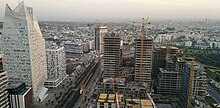Portal:Business
The Business and Economics Portal Business is the practice of making one's living or making money by producing or buying and selling products (such as goods and services). It is also "any activity or enterprise entered into for profit." A business entity is not necessarily separate from the owner and the creditors can hold the owner liable for debts the business has acquired. The taxation system for businesses is different from that of the corporates. A business structure does not allow for corporate tax rates. The proprietor is personally taxed on all income from the business. A distinction is made in law and public offices between the term business and a company such as a corporation or cooperative. Colloquially, the terms are used interchangeably. (Full article...) Economics (/ˌɛkəˈnɒmɪks, ˌiːkə-/) is a social science that studies the production, distribution, and consumption of goods and services. Economics focuses on the behaviour and interactions of economic agents and how economies work. Microeconomics analyses what is viewed as basic elements in the economy, including individual agents and markets, their interactions, and the outcomes of interactions. Individual agents may include, for example, households, firms, buyers, and sellers. Macroeconomics analyses the economy as a system where production, distribution, consumption, savings, and investment expenditure interact, and factors affecting it: factors of production, such as labour, capital, land, and enterprise, inflation, economic growth, and public policies that have impact on these elements. (Full article...) Selected articleThe General Theory of Employment, Interest and Money was written by the British economist John Maynard Keynes. Although The General Theory was written in the aftermath of the Great Depression and was taken by many to justify the assumption by government of the responsibility for the achievement and maintenance of full employment, it is for the most part a highly abstract work of theory and by no means a tract on policy. Its full meaning and significance continues to be debated even today. As a book, it is a difficult read for a modern student of economics, although it is enlivened by some brilliant rhetorical passages, including the description of the stock market in Chapter 12 and the concluding chapter 24 on the (rather tentative) policy implications Keynes derived from his theory. Selected image
Selected economyThe economy of Morocco is considered a relatively liberal economy, governed by the law of supply and demand. Since 1993, in line with many Western world changes, Morocco has followed a policy of privatisation. Morocco has become a major player in African economic affairs, and is the 5th largest African economy by GDP (PPP). The World Economic Forum placed Morocco as the most competitive economy in North Africa, in its African Competitiveness Report 2014–2015 Archived 19 January 2022 at the Wayback Machine. The economic system of the country is characterised by a large opening towards the outside world. In the Arab world, Morocco has the second-largest non-oil GDP, behind Egypt, as of 2017. Since the early-1980s, the Moroccan government has pursued an economic programme toward accelerating economic growth with the support of the International Monetary Fund, the World Bank, and the Paris Club of creditors. From 2018, the country's currency, the Moroccan dirham, is fully convertible for current account transactions; reforms of the financial sector have been implemented; and state enterprises are being privatised. (Full article...) Selected quote"Judgments of this kind must always be inferior to those which an able business man forms, by the aid of instincts based on long experience with regard to his own business. But they may be made much more trustworthy than they are at present, if they can be based on statistical measures of the relative quantities of the benefits and the injuries which different courses of public action are likely to cause to the several classes of the community. Much of the failure and much of the injustice, in which the economic policies of governments have resulted, have been due to the want of statistical measurement. A few people who have been strongly interested on one side have raised their voices loudly, persistently and all together; while little has been heard from the great mass of people whose interests have lain in the opposite direction; for, even if their attention has been fairly called to the matter, few have cared to exert themselves much for a cause in which no one of them has more than a small stake. The few therefore get their way, although if statistical measures of the interests involved were available, it might prove that the aggregate of the interests of the few was only a tenth or a hundredth part of the aggregate of the interests of the silent many." TopicsRelated WikiProjectsDid you know (auto-generated) -
On this day in business history
General imagesThe following are images from various business-related articles on Wikipedia.
More did you know
Business news Wikinews Economy and business portal
|







































